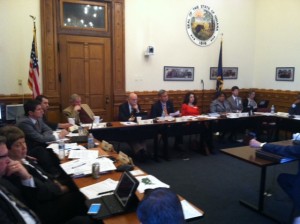The Indiana Senate Utilities Committee met on 1/31/2013 for nearly three hearings on SB 560 dealing with several utility issues in a standing room only committee room of the State House. Sen. Jim Merritt (R-Indianapolis) who chairs the committee asked opponents to testify first before the proponents after allowing Sen. Brandt Hershman (R-Buck Creek) to explain SB 560 and his three proposed amendments. Opponents to SB 560 ranged from statewide consumer and utility watchdog group Citizens Action Coalition, the Sierra Club and the Hoosier Environmental Council to the Indiana Industrial Energy Consumers (INDIEC) comprised of large manufacturing companies including members companies ArcelorMittal, Steel Dynamics and Nucor Steel. These groups focused their opposition to creation of a new tracker mechanism, changes in the test year for basing rate case filings and shifting risk from utility shareholders to monopoly ratepayers. Their testimony was very detailed and extensive drawing from specific experience in recent utility rate proceedings before the Indiana Utility Regulatory Commission (IURC). The opponents presented facts and figures as well as espousing how SB 560 violated the basic premise of balancing the interests of ratepayers with utility shareholder interests.
Indiana Propane Gas Association and several of their members specifically opposed the portion of the bill allowing natural gas utilities to build gas pipelines, etc. to connect rural Indiana customers not currently receiving natural gas service. These propane companies alleged that the language in SB 560 would allow natural gas utilities to extend service where it is uneconomic to do so and to make the other captive ratepayers to essentially provide an interest free loan to allow the gas utility to expand its service territory and increase its customer base at the expense of their members.
A representative of LS Power Development LLC addressed anti-consumer and anti-competitive aspects of the transmission language currently in Section 9 of the bill as well. LS Power described the impact of SB 560 on future transmission construction and how the proposed legislation addressed issues from the 2011 Federal Energy Regulatory Commission (FERC) Order 1000.
The primary proponents of SB 560 were Ed Simcox representing the Indiana Energy Association (IEA) which is the trade association for the investor-owned electric and natural gas utilities. NIPSCO VP Frank Shambo also testified supporting the bill. The association for the rural electric co-ops and a representative of the Indiana Farm Burueau also supported the bill.
The committee, however, voted 8-2 DO PASS as amended with all the Republican members voting for the bill plus Sen. John Broden (D-South Bend). Sen. Jean Breaux (D-Indianapolis) and Sen. Lonnie Randolph (D-East Chicago) both voted against the bill. The bill nows goes to the full Senate for second reading where it can be amended again and then third reading or final passage both which could take place as early as next week.
Laura Ann Arnold
This is link to an Indianapolis Star video of Sen Hershman and Kerwin Olson. Watch.
http://www.indystar.com/videonetwork/2132827938001/Debate-over-Senate-utility-legislation
Written by Tony Cook, Indianapolis Star, Jan 31, 2013
A wide-ranging bill that would make it faster and easier for Indiana utilities to raise rates received support Thursday from a state Senate committee.
The Utility Committee voted 8-2 to support Senate Bill 560. The bill, proposed by Sen. Brandt Hershman, R-Buck Creek, would make several changes to how electric and natural gas rates are established.
The bill would change the ratemaking process for distribution upgrades, such as replacing power lines or natural gas pipelines. Right now, utilities get a rate of return on those improvements through base rate cases, which are extensive full-scale reviews of the company’s expenses and revenues that can take more than a year. Under the bill, utilities could seek rate increases more frequently for individual projects through a smaller-scale review process known as “tracking.”
Opponents say the change would make it easier for utilities to hike customers’ rates. Proponents say it would prevent “rate shock” by allowing smaller, incremental rate increases.
The bill also would limit the amount of time state regulators have to approve base rate cases to 300 days. Currently, those cases sometimes take 18 months. Utility companies say the measure would make the regulatory process more efficient, but consumer advocates worry regulators and others wouldn’t have enough time to fully vet requested rate increases.
The bill also contains other measures, including some intended to boost economic development and extend natural gas pipelines into more rural areas of the state. Opponents complain those measures would force existing ratepayers to subsidize new development.
Call Star reporter Tony Cook at (317) 444-6081 and follow him at twitter.com/indystartony.



